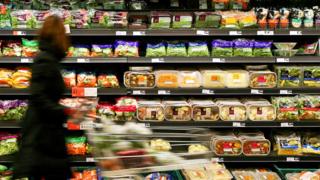Sainsbury’s-Asda merger blocked by regulator
 Image copyright Alamy
Image copyright Alamy The proposed merger between Sainsbury’s and Asda has been blocked by the UK’s competition watchdog.
The Competition and Markets Authority (CMA) said it would raise prices for consumers and worsen the experience of millions of shoppers.
Sainsbury’s boss Mike Coupe said the regulator was “effectively taking £1bn out of customers’ pockets”.
But he said the supermarket would not appeal against the decision.
“The CMA’s conclusion that we would increase prices post-merger ignores the dynamic and highly competitive nature of the UK grocery market,” Mr Coupe said.
Why did the supermarkets want to merge?
The deal would have created the UK’s biggest supermarket chain, accounting for £1 in every £3 spent on groceries.
Sainsbury’s and Asda had said it would have cut their costs, allowing them to lower prices for consumers across the UK.
But the CMA, which had previously raised concerns about the deal, said the merger would lessen competition at both a national and local level.
Stuart McIntosh, chair of the CMA’s inquiry group, told the BBC’s Today programme: “It would reduce competition in supermarkets and online grocery shopping and at the companies’ petrol stations.
“We think that is likely to lead to higher prices or other changes which would be unwelcome to shoppers, such as longer check out queues.”
What concessions had the supermarkets offered?
Earlier this year Sainsbury’s and Asda, which is owned by US retail giant Walmart, promised to sell between 125 and 150 of their supermarkets to allow the merger to proceed, along with some petrol stations and convenience stores.
They also pledged to bring in £1bn of price cuts for consumers if the deal went ahead, and be held to this by an independent guarantor.
Sainsbury’s said the CMA had ignored this offer, and misunderstood the potential impact on competition.
But the CMA said it had conducted surveys of 50,000 of the supermarkets’ customers.
“Those promises were based on cost savings which we don’t think are likely to be realised. Also those price promises are very likely to be difficult to track in practice,” Mr McIntosh said.



